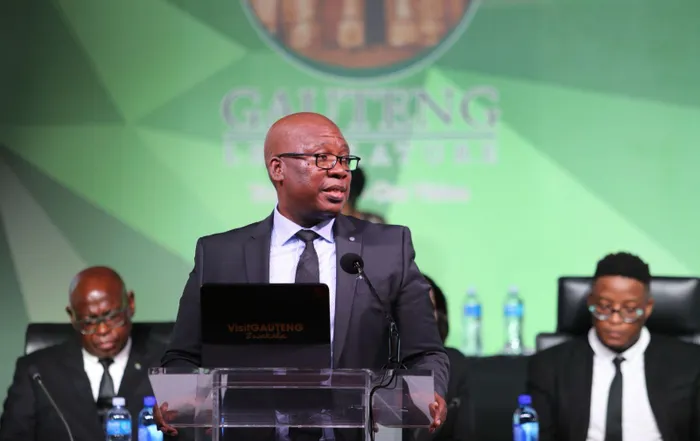Lesufi’s government undermines the role of opposition by withholding information
Opinion

Panyaza Lesufi The Gauteng Premier, Panyaza Lesufi, has refused the request for access to the records requested, says the writer.
Image: Oupa Mokoena Independent Newspapers
The Democratic Alliance (DA) Gauteng, the official opposition in the province, is committed to safeguarding South Africa’s constitutional democracy, the principles and values espoused in the founding document.
Nonetheless, our efforts as the opposition to conduct oversight over the elected executive are increasingly thwarted.
The growing barriers to effective and meaningful conduct oversight are deliberate withholding and denial of crucial information, procedural delays and protracted legal battles that severely undermine our oversight role.
The affected areas are irregular procurement and contract management, unlawful appointments, and the lack of consequence management due to not enforcing recommendations from disciplinary action.
The Constitution of the Republic of South Africa explicitly highlights the separation of powers among the legislature, executive and judiciary, establishing much-needed mechanisms for effective oversight, a fundamental pillar of good governance.
In a healthy democracy, transparency and accountability are important principles. Laws regulating access to information are put in place to ensure that the public has access to the decision-making processes of those in power to hold them accountable for their actions.
There has been a growing reluctance or outright refusal by the governing party and those in leadership to provide vital information to enable effective scrutiny.
Effective legislative oversight relies heavily on access to accurate, timely and complete information. The legislature’s ability to scrutinise government actions, expenditure, and hold public officials accountable centres on this access.
When the executive withholds information, be it through vague, sub-par or incomplete responses to questions in the house, dismissing Promotion of Access to Information Act (PAIA) requests, or invoking the Protection of Personal Information Act (POPIA) to shield data, our capacity as opposition to fulfil this oversight mandate diminishes. This casts a shadow on the executive promise of good governance and fulfilling their mandate.
This increase in information withholding has profound implications. Without transparency, there is no way to verify whether departments are acting in the best interests of the public or if resources are being misappropriated. This lack of transparency and accountability becomes a breeding ground for corrupt and unethical conduct, financial mismanagement and misconduct, which ultimately leads to poor service delivery.
Through the Promotion of Access to Information Act (PAIA), the DA has since October last year demanded full access to 177 forensic reports dating from 2016 to the present.
The Gauteng Premier, Panyaza Lesufi, refused the request for access to the records requested. However, the refusal did not provide adequate reasons based on the provisions of the Promotion of Access to Information Act (PAIA) that the Office of the Premier relied on.
The DA Gauteng appealed the decision to refuse access to the reports internally in November, but the appeal was dismissed the following month. In January, we approached the Information Regulator, where the pre-investigation report found that “there is a prima facie case that the complainant met the minimum requirements prescribed in PAIA, in that the request form was duly submitted to the public body.”
According to the Information Regulator, the alleged refusal by Lesufi’s office to grant access and failure to state adequate reasons for the refusal, including the provisions of PAIA relied on, necessitates an investigation of the complaint to ascertain whether the requester (DA) must be given access to the records.
The use of legal provisions such as POPIA to justify withholding information raises concerns about the misuse of privacy laws as shields rather than safeguards. While protecting personal data is essential, these laws must not be weaponised to conceal misconduct and prevent public scrutiny. There must be a balanced approach that respects individual rights without compromising the public’s right to know when such disclosure is both lawful and justifiable.
Furthermore, any reliance on privacy concerns must be weighed against the public interest in disclosure, particularly in cases where the public interest outweighs any purported confidentiality claims.
While POPIA is designed to regulate the lawful processing of personal information, it balances the right to privacy with the right to access information. The Act explicitly provides for instances where disclosure is necessary and lawful.
The ruling, therefore, emphasises how difficult it is for the public and government to balance between privacy, transparency, and due process. This is not the first time that our PAIA applications have been unsuccessful in what we increasingly view as the shielding of corrupt officials, politicians, and activities within the Gauteng Provincial Government (GPG).
The biennial report of the Gauteng Ethics Advisory Council (GEAC) for 2025 has restated what the DA Gauteng has been exposing about corruption, maladministration, non-compliance with relevant legislation and regulations and ethical violations severely affecting the delivery of services to residents of Gauteng.
For a thriving democracy, transparency and accountability are not optional; they are overarching values of our democracy. When the government withholds information, it not only hampers oversight but also endangers the principles of good governance, eroding public trust and inviting corruption.
Corruption flourishes in the shadows of secrecy, undermining development initiatives and diverting resources for education, healthcare, infrastructure development and service delivery. A DA-led Gauteng-led provincial government would have released all 177 forensic reports without any opposition parties using any mechanisms to request them.
We would have immediately implemented all the recommendations made in these reports to demonstrate our commitment to fighting corruption. Transparency is an important principle that the DA will vigorously fight for to ensure that unethical conduct is eradicated in our provincial government.
Solly Msimanga, MPL, DA Gauteng Leader of the Official Opposition